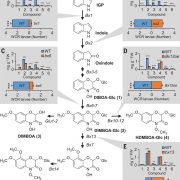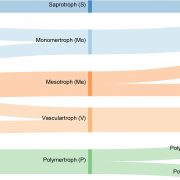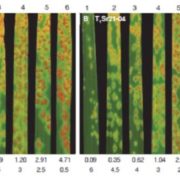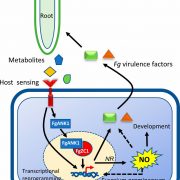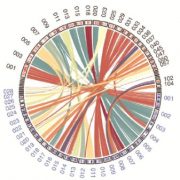Plant-pathogen arms race: A pathogen effector protein inhibits trans-kingdom RNAi (Cell Host & Microbe)
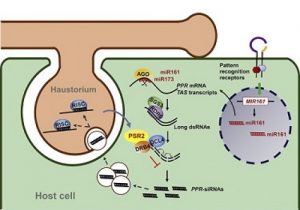 Phytophthora spp. are highly aggressive fungus-like pathogens that cause various blight and rot diseases in many crops. Upon invasion of host cells, Phytophthora delivers thousands of effector proteins. Some of these effectors suppress the host RNA silencing pathway, which is mediated by a diverse group of small RNAs including microRNAs (miRNAs), and small interfering RNAs (siRNAs). Hou et al. show that a Phytophthora effector specifically inhibits miRNA-triggered secondary siRNA biogenesis from a group of Arabidopsis transcripts mainly belonging to the PPR gene family. The production of these secondary siRNAs (and their corresponding miRNA triggers) is induced in Arabidopsis as a defense response to Phytophthora capsici infection. Arabidopsis delivers these secondary siRNAs packaged within extracellular vesicles to silence effector transcripts in Phytophthora. The authors showed that introducing some of these secondary siRNAs into Phytophthora decreased its growth and its ability to cause disease. Secondary siRNAs have also been implicated in other plant-pathogen interactions. The findings by Hou et al. further confirm a conserved role of secondary siRNAs in trans-kingdom RNAi. (Summary by Saima Shahid) Cell host & Microbe 10.1016/j.chom.2018.11.007
Phytophthora spp. are highly aggressive fungus-like pathogens that cause various blight and rot diseases in many crops. Upon invasion of host cells, Phytophthora delivers thousands of effector proteins. Some of these effectors suppress the host RNA silencing pathway, which is mediated by a diverse group of small RNAs including microRNAs (miRNAs), and small interfering RNAs (siRNAs). Hou et al. show that a Phytophthora effector specifically inhibits miRNA-triggered secondary siRNA biogenesis from a group of Arabidopsis transcripts mainly belonging to the PPR gene family. The production of these secondary siRNAs (and their corresponding miRNA triggers) is induced in Arabidopsis as a defense response to Phytophthora capsici infection. Arabidopsis delivers these secondary siRNAs packaged within extracellular vesicles to silence effector transcripts in Phytophthora. The authors showed that introducing some of these secondary siRNAs into Phytophthora decreased its growth and its ability to cause disease. Secondary siRNAs have also been implicated in other plant-pathogen interactions. The findings by Hou et al. further confirm a conserved role of secondary siRNAs in trans-kingdom RNAi. (Summary by Saima Shahid) Cell host & Microbe 10.1016/j.chom.2018.11.007



